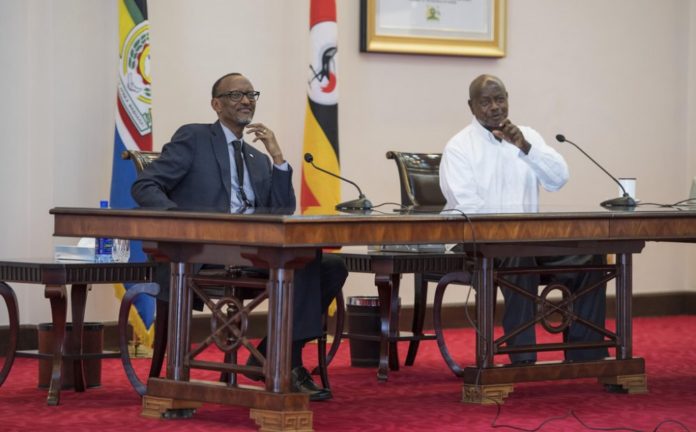
By Erasme Rugemintwaza
In the recent World Cup qualifiers matches, Uganda beat Rwanda in both matches. As I watched these two highly competitive matches, my mind drifts away from the sport and soar into the currently cold diplomatic relations between the two countries.
The matches reminded me of the Gatuna border between Rwanda and Uganda which is still closed to human and freight traffic for over two years. Yet the historical ties between the political movements in power in the two countries – the National Resistance Movement / Army (NRM / NRA) and the Rwandan Patriotic Front (RPF) – can easily be considered the deepest and weaved ones in modern Africa history.
A lot of RPF and NRA cadres were once schoolmates, fighting comrades and best friends who together share many intimate memories. Therefore, it is sad and appalling to see these old allies, brothers, turn into “enemies” who look at each other with contempt and like faience dogs. When rebel leader – now Ugandan President – Yoweri Museveni formed the National Resistance Army (NRA), which waged a guerrilla war in the Luweero bush, against the government of former President Milton Obote, many Rwandans joined and eventually formed a core centre of the rebellion. It was here that Fred Rwigyema fought for the first time alongside a number of future RPF leaders including the future Rwandan president Paul Kagame, James Kabarebe, Patrick Karegeya and Kayumba Nyamwasa. According to Professor Mahmood Mamdani’s estimates, when the NRA took power in 1986, it numbered 16,000 men and around 4,000 soldiers were Rwandans. After the war, many Rwandans ended up occupying different positions in the new NRA/NRM government. Kagame became the chief of intelligence.
But once the war of bush won in Uganda, the RPF have been created and take shape under the leadership of Rwigyema. And on October 1, 1990, war against the Rwandan government began across the northeast of the country. However, on the second day Rwigyema was mysteriously killed and at the end of October the RPF was largely defeated by the Rwandese Armed Forces (FAR). Without the assistance of Uganda, which opened its borders to let soldiers from all sides pour in to help, the RPF / APR was on the verge of a humiliating defeat because it was weakened by the death of Rwigyema and the disbandment in front of the FAR supported by their friends including France and Zaïre.
But it also took the return of Major Kagame, 33, whom many believe was sorted out by President Museveni, from his training in the United States to take the reins as the new RPF/APR leader. Without a doubt, the survival of the RPF at the time depended entirely on the kindness of Uganda. In August 1993, the Arusha Peace Agreement was signed in a ceremony attended by Uganda, Tanzania, Burundi and the Democratic Republic of the Congo. It provided for the establishment of a broad-based transitional government comprising the RPF and the opposition parties. The Arusha agreements either required full respect for the agreement or the agreement transgression. The RPF/ APR option was the second, to transgress the agreement because it wanted total power owed a lot to Uganda. Michela Wrong quotes a retired Ugandan commander saying: “We considered the RPF to be young sons, not even brothers”. Referring to the past, Ugandans dwell on how the NRA welcomed Rwandans into its ranks, as it helped them organize the conquest of Rwanda. And for that, they still believe that the Rwandans owe them their victory. But for their part, what Rwandans remember is rather the dependence of the NRA on them to wage its dirtiest battles, and the feeling of having always been unwelcome in foreign territory.
The problem with history is not that people don’t learn from its lessons, but that they learn the wrong ones. For the NRM and the RPF, their most valuable asset is the rich, interwoven history they share. If only they could sit down – man-to-man – to reflect and resolve their differences Uganda and Rwanda would both be winners even in sporting events like these that made me dreaming, because in fact after all, Rwandans and Ugandans are brothers and sisters in many ways even before the regimes of these two arrogant and capricious rebels.




























































